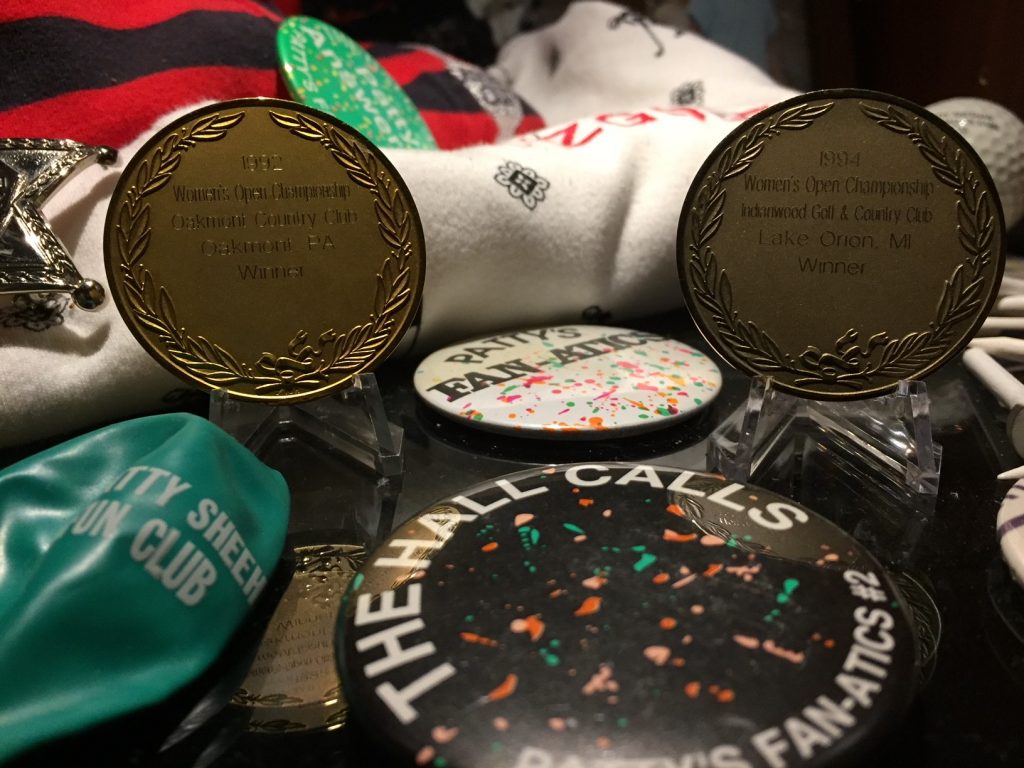By Travis Puterbaugh, Curator of the World Golf Hall of Fame
As seen on WomensGolf.com
By the beginning of the 1990s, Patty Sheehan found herself on a direct course towards enshrinement in the World Golf Hall of Fame. The LPGA Rookie of the Year in 1981, Sheehan broke out with back-to-back LPGA Championships in 1983 and 1984. From 1982 through July 1990, she won 23 times on tour and had narrowly missed winning the U.S. Women’s Open with second-place finishes in 1983 and 1988.
The 1990 U.S. Women’s Open at the Atlanta Athletic Club offered Sheehan perhaps her best opportunity to capture this elusive Major Championship. Nancy Lopez called the Riverside Course “the least intimidating Open course” she had ever played, while Louise Suggs called it the easiest she had ever seen. A recent four-stroke victory at the Rochester International over Amy Alcott had Sheehan primed and ready to win in Atlanta.
Despite rain delays throughout the first two rounds, Sheehan found herself 10 under par, the only golfer – male or female – to reach that mark at any stage of a U.S. Open. Because of the rain delays, the final two rounds were played on Sunday, and after the third round, everything set up perfectly for Sheehan, who took a nine-stroke lead into the final 18 holes.
Unfortunately for Sheehan, she would once again finish in second place, this time in the most unfathomable of ways. Fighting through fatigue, low blood sugar and dehydration, Sheehan stumbled through her final round and allowed the defending tournament champion Betsy King to catch her on the 11th hole. Needing a birdie on the 18th to tie King and force a playoff, Sheehan fell one stroke short.
Long-time LPGA fans recall her emotional post-round interview with Judy Rankin, a moment Sheehan called “the lowest emotionally she had ever been from a golf tournament.” Still despite the trauma of the event, Sheehan refused to let it define her career. Sheehan won two more tournaments in 1990 to give her five for the year, and she became just the second female player to exceed $700,000 in a single season.
However, she still sought redemption for Atlanta. It would not come in 1991, when she finished T-14 during a season which would yield only one victory. Sheehan would have to wait until the 1992 U.S. Women’s Open at Oakmont Country Club. Coming in with two wins in her last three starts, she refused to think about Atlanta or anything other than the golf ahead of her.
“My attitude for the week was to work on two swing thoughts: a good turn and slow tempo,” Sheehan said. “I was not going to worry about anything else. I figured I couldn’t be any more devastated and disappointed than I had been in 1990, so everything was going to be better.”
Sheehan got off to a fine start at Oakmont, posting scores of 69 and 72 to only trail former San Jose State teammate Juli Inkster. The two would go head-to-head over the weekend, and eventually Sheehan found herself trailing by two with two holes remaining on Sunday. Just as rain delays had been a factor in 1990, this time a nearly two-hour rain delay came at precisely the right moment.
Sheehan, who used the delay to regroup and compose herself after three-putting on 16, produced two birdies when play resumed while Inkster had to settle for pars, forcing an 18-hole playoff on Monday. After a birdie on the opening hole, Sheehan would never trail during the playoff, at one point holding a five-stroke lead over Inkster. Despite narrowing the margin to three-down on the final hole, Inkster could not overcome the deficit. Sheehan had escaped the demons of Atlanta and won her national championship, which she would do once again in 1994.
When Richard Nixon said, “Only if you’ve been in the deepest valley can you ever know how magnificent it is to be on the highest mountain,” he may as well have been speaking directly to Patty Sheehan, whose U.S. Women’s Open experiences would allow her to truly understand that feeling.
“It was such a great comeback from 1990, and emotionally it healed so many wounds,” Sheehan said. “It was the most significant win of my career, because I overcame so much doubt. It would have been very hard to live the rest of my life without winning an Open.”


